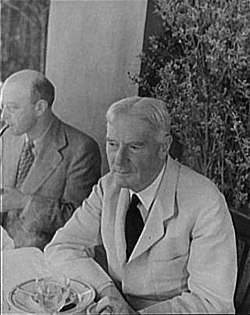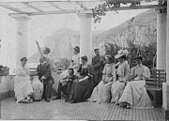Norman Douglas
| Norman Douglas | |
|---|---|
 Norman Douglas in 1935 | |
| Born |
George Norman Douglass 8 December 1868 Thüringen, Austria-Hungary |
| Died |
7 February 1952 (aged 83) Capri, Italy |
| Resting place |
Cimitero acattolico ("Non-Roman-Catholic cemetery"), Capri[1] 40°33′05″N 14°14′04″E / 40.5514°N 14.2345°E |
| Pen name |
Normyx Pilaff Bey |
| Occupation | Writer |
| Language | English |
| Nationality | British |
| Notable works |
South Wind Old Calabria Some Limericks |
| Spouse | Elizabeth Louisa Theobaldina FitzGibbon (1898–1903) |
George Norman Douglas (8 December 1868 – 7 February 1952) was a British writer, now best known for his 1917 novel South Wind. His travel books such as his 1915 Old Calabria were also appreciated for the quality of their writing.
Life
Norman Douglas was born in Thüringen, Austria (his surname was registered at birth as Douglass).[2] His mother was Vanda von Poellnitz. His father was John Sholto Douglas (1845–1874), manager of a cotton mill, who died in a climbing accident when Douglas was about six. He spent the first years of his life on the family estate, Villa Falkenhorst, in Thüringen.
Douglas was brought up mainly in Scotland at Tilquhillie, Deeside, his paternal home. He was educated at Yarlet Hall and Uppingham School in England, and then at a grammar school in Karlsruhe.[3] Douglas's paternal grandfather was the 14th Laird of Tilquhillie. Douglas's maternal great-grandfather was General James Ochoncar Forbes, 17th Lord Forbes.
He started in the diplomatic service in 1894 and from then until 1896 was based in St. Petersburg, but was placed on leave following a sexual scandal. In 1897 he bought a villa (Villa Maya) in Posillipo, a maritime suburb of Naples. The next year he married a cousin Elizabeth Louisa Theobaldina FitzGibbon (their mothers were sisters, daughters of Baron Ernst von Poellnitz). They had two children, Louis Archibald (Archie) and Robert Sholto (Robin),[4] but divorced in 1903 on grounds of Elizabeth's infidelity. Norman's first book publication, (Unprofessional Tales (1901)) was written under the pseudonym Normyx, in collaboration with Elizabeth.
He moved to Capri, spending time there (at the Villa Daphne) and in London, and became a more committed writer. Nepenthe, the fictional island setting of South Wind, is Capri in light disguise. There he was friends with the eccentric community and opium addict Baron Jacques d'Adelswärd-Fersen. In 1912–1914 he worked for The English Review. He met D. H. Lawrence through this connection. This led to a feud, after Lawrence in his 1922 novel, Aaron's Rod based a character on Douglas.[5] In late 1916 he jumped bail in London on a charge of indecent assault on a sixteen-year-old boy, and effectively then lived in exile. He himself wrote of this in self-exculpation: "Norman Douglas of Capri, and of Naples and Florence, was formerly of England, which he fled during the war to avoid persecution for kissing a boy and giving him some cakes and a shilling". (The boy in fact complained to the police).
In the book Twentieth Century Authors, Douglas stated he disliked Marxism, Puritanism, and "all kinds of set forms, including official Christianity".[3]
During Douglas's years in Florence, he was associated with the publisher and bookseller Pino Orioli, who published in Italy in his 'Lungarno' series a number of Douglas's books and also works by other English authors, many of which (such as the first edition of Lawrence's Lady Chatterley's Lover), would have been prosecuted for obscenity if published in London. Douglas probably had a major hand in writing Orioli's autobiography, Adventures of a Bookseller. Douglas' 1920 novel They Went is a fantasy based on Breton folklore.[3]

Further scandals led to Douglas leaving Italy for the south of France in 1937. Following the collapse of France in 1940 Douglas left the Riviera, and on a circuitous journey to London, where he lived from 1942 to 1946, he published the first edition of his Almanac in a tiny edition in Lisbon. He returned to Capri in 1946 and was made a citizen of the island. His circle of acquaintances included the writer Graham Greene, the composer Kaikhosru Shapurji Sorabji and the food writer Elizabeth David.
He died in Capri, apparently deliberately overdosing himself on drugs after a long illness. (see Impossible Woman: Memoirs of Dottoressa Moore, ed. by Greene). His last words are reputed to have been: "Get those fucking nuns away from me."[6] The Latin inscription on his tombstone, from an ode by Horace, reads: Omnes eodem cogimur,[4] "We are all driven to the same end" (i.e., death).[7]

Reception
H. M. Tomlinson, a contemporary of Douglas's, concluded his 1931 biography by saying that Douglas's kind of prose "is at present out of fashion". He compared the writing to that of great English essayists and novelists: to Jonathan Swift's irony and Laurence Sterne's warmth.[8]
Peter Ackroyd describes Douglas's London Street Games as "a vivid memorial to the inventiveness and energy of London children, and an implicit testimony to the streets which harboured and protected their play."[9]
John Sutherland reports that "Douglas's Mediterranean travel writing chimed with the public taste", and that "there was a time when, in smart literary conversations, Norman Douglas was regarded as one of the smartest things going. Part of that smartness was his keeping, for the whole of his long depraved life, one jump ahead of the law."[10]
In The Grand Tour and Beyond: British and American Travellers in Southern Italy, 1545–1960, Edward Chaney, wrote that "the true heir to the great tradition of the 'pedestrian tour' in our own [20th] century has been 'pagan-to-the-core' Norman Douglas. Having first visited the south of Italy with his brother in 1888, before he was 30 he had abandoned his pregnant Russian mistress and his job at the British Embassy in St Petersburg and purchased a villa at Posillipo. By then he had also published his first piece on the subject of southern Italy.." [11]
Works
Douglas's most famous work South Wind is a fictionalised account of life in Capri, with controversial references to moral and sexual issues. It has been frequently reprinted.[3]
His travel books also combine erudition, insight, whimsicality, and some fine prose. These works include Siren Land (1911), Fountains in the Sand, described as "rambles amongst the oases of Tunisia" (1912), Old Calabria (1915),[12] Together (Austria) (1923) and Alone (Italy) (1921).[12] Reviewing Douglas's work in Italian Americana, John Paul Russo wrote:
Douglas .. published three travel books of his walking tours of Italy: Siren Land, ... Old Calabria ... and Alone ... Scholars prefer the first; Douglas and his afficionados, the third; but the common reader has decided upon the middle work as the masterpiece.[12]
Douglas's early pamphlets on Capri were revised in Capri (privately published, 1930). His last published work was A Footnote on Capri (1952).
In 1928, Douglas published Some Limericks, an anthology of more-or-less obscene limericks with a mock-scholarly critical apparatus. This classic (of its kind) has been frequently republished, often without acknowledgment in pirate editions. A definitive edition has now been published.[13]
List of works
- Unprofessional Tales (1901) as "Normyx" with his then wife Elsa FitzGibbon.[14]
- The Forestal Conditions of Capri (1904)
- Three Monographs (1906)
- Some Antiquarian Notes (1907)
- Siren Land (1911) travel book
- Fountains In The Sand (1912)
- Old Calabria (1915) travel book
- London Street Games (1916)
- South Wind (1917) novel
- They Went (1920) novel
- Alone (1921) travel book
- Together (1923) travel book
- D.H. Lawrence and Maurice Magnus: A Plea for Better Manners (1924)
- Experiments (1925)
- In the Beginning (1927) novel
- Nerinda (1929)
- One Day (1929)
- Birds and Beasts of the Greek Anthology (1927)
- Some Limericks (1928)
- Paneros (1930). essay on aphrodisiacs
- Capri: Materials for a Description of the Island (1930)
- How About Europe? (1930)
- Three Of Them (1930)
- Summer Islands: Ischia and Ponza (1931)
- Looking Back (1933) autobiography
- An Almanac (1945)
- Late Harvest (1946) autobiography
- Venus in the Kitchen (1952) cookery, written under the pseudonym Pilaff Bey
- Footnote on Capri (1952)
Norman Douglas in fiction
- James Joyce's Finnegans Wake (1939) makes several dozen references to London Street Games.
- Vladimir Nabokov's character Sebastian Knight in The Real Life of Sebastian Knight (1941) owns a copy of South Wind.
- Anthony Burgess's Earthly Powers (1980) makes occasional reference to Norman Douglas.
- Robertson Davies' character John Parlabane makes reference to Douglas in the Cornish Trilogy novel, The Rebel Angels (1980).
- Roger Williams's Lunch With Elizabeth David (Little, Brown, 1999) features Douglas as a major character.
- Alex Preston's In Love and War (2014) features Douglas as a character.
Notes
- ↑ Capri Tourism. Capri Tourism. Retrieved on 10 August 2011.
- ↑ The Douglas Archives. douglashistory.co.uk. Retrieved on 12 February 2012.
- 1 2 3 4 Kunitz, Stanley J.; Haycraft, Howard, eds. (1950). Twentieth Century Authors: A Biographical Dictionary of Modern Literature (3rd ed.). New York: H. W. Wilson. pp. 393–5.
- 1 2 Collection Norman Douglas – Robert Kohler. Normandouglas.ch. Retrieved on 10 August 2011.
- ↑ Douglas's side of the story is recounted in A Plea for Better Manners, the last essay in Experiments (Chapman and Hall, 1926).
- ↑ Old Calabria (via Google Books), by Norman Douglas; Northwestern University Press; 1996 edition; introduction by Jon Manchip White, page xvi
- ↑ Horace, Ode 2.3. Merriampark.com. Retrieved on 10 August 2011.
- ↑ H.M. Tomlinson. Norman Douglas. 1931. Pages 62–63.
- ↑ Peter Ackroyd. London: The Biography. New edition, Vintage, 2001. Page 665.
- ↑ John Sutherland, 2011. Pages 269–270.
- ↑ Edward Chaney, The Evolution of the Grand Tour: Anglo-Italian Cultural Relations since the Renaissance, 2nd edition, Routledge, 2000, Pages 127–28.
- 1 2 3 Russo, John Paul (Summer 1998). "Reviews: Old Calabria by Norman Douglas". Italian Americana. 16 (2). JSTOR 29776512. (subscription required)
- ↑ Eclectics & Heteroclites 11 – Some Limericks – Norman Douglas. Atlaspress.co.uk. Retrieved on 10 August 2011.
- ↑ Joseph F. Clarke (1977). Pseudonyms. BCA. p. 123.
References
- Brackett, Virginia; Gaydosik, Victoria (2006). The Facts on File Companion to the British Novel: Beginnings through the 19th century. Infobase Publishing.
- Sutherland, John (2011). Lives of the Novelists: A History of Fiction in 294 Lives. Profile Books.
- Ouditt, Sharon (2013). Impressions of Southern Italy: British Travel Writing from Henry Swinburne to Norman Douglas. Routledge.
- Davenport, John (1955), 'Introduction' to a reprint of Old Calabria.
- Dawkins, Richard MacGillivray: Norman Douglas. G. Orioli, Florence, 1933. Enlarged and revised edition: Rupert Hart-Davies, London, 1952.
- Holloway, Mark (1976) Norman Douglas, A Biography
- Leary, Lewis (1968) Norman Douglas. Columbia Essays on Modern Writers, Columbia University Press.
- Meusberger, Wilhelm (2004) Norman Douglas: A Portrait. Edizione La Conchigli, Via le Botteghe, Capri.
- Tomlinson, Henry Major (1931) Norman Douglas. 'The Dolphin Books', Chatto & Windus, London.
External links
| Wikiquote has quotations related to: Norman Douglas |
- Photos of Norman Douglas (in German)
- Family photos (in German)
- Works by Norman Douglas at Project Gutenberg
- Works by or about Norman Douglas at Internet Archive
- "Archival material relating to Norman Douglas". UK National Archives.

- Norman Douglas at the Internet Speculative Fiction Database
- Norman Douglas at Library of Congress Authorities, with 97 catalogue records